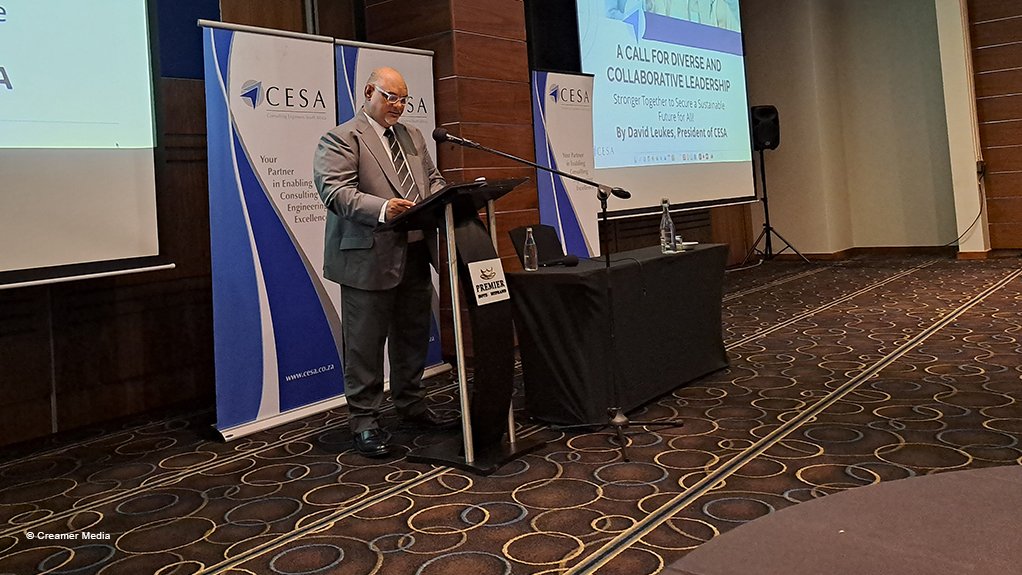Cesa, ISA discuss infrastructure development imperatives
With Gauteng accounting for 60% of South Africa’s national trade, 40% of foreign direct investment, 50% of small- and medium-sized enterprises and 34% of the country’s GDP, it is imperative that government and the private sector, including consulting engineers, ramp up efforts to address the 13 critical aspects affecting the province.
Dubbed the “G13 crisis” by Gauteng Premier Panyaza Lesufi in March, he called for extraordinary efforts to deal with cable theft, vandalism, corruption, potholes, electricity and water insecurity, a lack of schools, poor hospital service, failing infrastructure and high unemployment.
Consulting Engineers South Africa (Cesa) president David Leukes addressed delegates during a G13 discussion, in Midrand, on May 20, highlighting the National Treasury’s estimate that R2-trillion needs to be spent nationally on infrastructure upgrades and new builds by 2030 to fulfil developmental objectives.
He said this goal could only be realised through ethical leadership, skills development and public-private partnerships (PPPs).
“More qualified professionals and properly accredited consulting firms can help ensure the integrity, efficiency and sustainability of infrastructure projects,” he stated.
Leukes stressed the importance of developing and retaining young professionals in the engineering profession, especially in Gauteng, by providing exposure to practical experience and meaningful opportunities for learning and career growth.
With more PPPs slowly taking shape in the energy and logistics space, Leukes said the strength of these partnerships could also be leveraged with infrastructure projects at provincial and local government level. He added that the engagements should include community stakeholders to ensure infrastructure projects served the intended beneficiaries.
He encouraged Cesa’s members to actively participate in shaping the built environment’s future by embracing technology and innovation as key enablers of sustainable development.
Leukes also emphasised the importance of global collaboration in dealing with the G13 challenges in Gauteng, which would be assisted by the 2025 International Federation of Consulting Engineers Global Infrastructure Conference to be held in Cape Town for the first time from September 21 to 23.
He added that South Africa’s role in global and African infrastructure was increasingly significant, hence the time was now for the country to play a strategic role in infrastructure investment and development.
Leukes added that global stakeholders were increasingly focusing on an interconnected ecosystem where each infrastructure project fed into the next.
He expressed hope that local policymakers and developers would consider the increasing importance of a lifecycle and integrated approach to infrastructure development, from conception to maintenance to repurposing.
Meanwhile, the engineering profession increasingly demands robust soft skills such as problem-solving, teamwork and people management, in addition to existing demands of technical proficiency.
In this regard, Leukes advocated for more mentorship programmes and specialised training initiatives in the consulting engineering industry, particularly if South Africa was to produce a targeted 30 000 new artisans every year by 2030.
Only through public sector professionalisation, ethical leadership, institutional oversight in public procurement, skilled workforces and sustainability at the heart of development would Gauteng, and South Africa, succeed in becoming economically robust, Leukes stated.
Cesa Gauteng branch chairperson and Avenir Holdings CEO Tshidi Mndzebele emphasised the need for urgent upgrades to aging infrastructure and the introduction of modern, sustainable solutions, since Johannesburg Water alone had a R27-billion infrastructure backlog which risked pollution, degradation and public health impacts if it remained unaddressed.
Additional consequences of infrastructure decay were corruption and crime, which only added to the province’s existing challenges, she added.
Echoing Leukes, Mndzebele also stressed the need for integrated sustainable water management, robust infrastructure investment and for social and economic regard to be given to any improvements.
“Consulting engineers are urged to lead in advocating for long-lasting infrastructure development according to a full lifecycle approach, and to collaborate for a more connected, resilient and equitable future.”
PROJECT PROGRESS
Infrastructure South Africa (ISA) infrastructure pipeline development programme lead Nomfundo Mbatha estimated the total gross fixed capital formation (GFCF) funding gap in the country at R2.7-trillion, which means that R449-billion will be required over the next three years to reach the 30% GFCF National Development Plan (NDP) target.
She pointed out that between 16 and 20 megaprojects would need to go to market every year to reach this target.
Currently, public spending GFCF is at 4.2% as a share of GDP and private spending is at 10.6% as a share of GDP, totalling 14.8%, against the NDP’s target of 10%, 20% and 30%, respectively.
Mbatha highlighted that 93% of South African households had access to electricity and 85% of households had access to water, but there were moderate degrees of variability across different regions.
For example, some rural district households have 50% rates of water accessibility.
Access to sanitation is 66% on average for national households, also with high degrees of variability across different regions.
These developmental gaps highlight the urgency of project preparation support, which ISA undertakes. ISA, a Department of Public Works and Infrastructure entity, also oversees the development of Strategic Integrated Projects (SIPs), which total 268 projects since 2020 and span sectors such as water and sanitation, waste management, transport, human settlements, energy and digital infrastructure.
Of the 268 SIPs, 82 are under construction, 46 in the procurement phase, 40 in the design development phase, 51 in the feasibility phase and 25 have been completed.
The total project value of SIPs gazetted between 2020 and 2024 is R3-trillion.
Nonetheless, Mbatha said South Africa faced severe infrastructure development hurdles owing to fiscal constraints, inefficient resource allocation and challenges in accessing external financing.
For example, she highlighted that R6-billion a year is needed on project preparation, which involves preparing quality bankable projects for investment, to achieve the NDP target growth levels by 2030.
Yet, ISA is allocated R600-million over a three-year period to support project preparation. ISA managed to provide 35 projects with project preparation support in the last financial year, compared with 45 that needed this support.
“The current gap in funding towards the preparation stages of projects towards investment is a major hindrance in achieving accelerated infrastructure development.
“A collaborative approach between the public and private sectors to realise more innovative funding mechanisms and implementation solutions is needed,” Mbatha said.
Article Enquiry
Email Article
Save Article
Feedback
To advertise email advertising@creamermedia.co.za or click here
Announcements
What's On
Subscribe to improve your user experience...
Option 1 (equivalent of R125 a month):
Receive a weekly copy of Creamer Media's Engineering News & Mining Weekly magazine
(print copy for those in South Africa and e-magazine for those outside of South Africa)
Receive daily email newsletters
Access to full search results
Access archive of magazine back copies
Access to Projects in Progress
Access to ONE Research Report of your choice in PDF format
Option 2 (equivalent of R375 a month):
All benefits from Option 1
PLUS
Access to Creamer Media's Research Channel Africa for ALL Research Reports, in PDF format, on various industrial and mining sectors
including Electricity; Water; Energy Transition; Hydrogen; Roads, Rail and Ports; Coal; Gold; Platinum; Battery Metals; etc.
Already a subscriber?
Forgotten your password?
Receive weekly copy of Creamer Media's Engineering News & Mining Weekly magazine (print copy for those in South Africa and e-magazine for those outside of South Africa)
➕
Recieve daily email newsletters
➕
Access to full search results
➕
Access archive of magazine back copies
➕
Access to Projects in Progress
➕
Access to ONE Research Report of your choice in PDF format
RESEARCH CHANNEL AFRICA
R4500 (equivalent of R375 a month)
SUBSCRIBEAll benefits from Option 1
➕
Access to Creamer Media's Research Channel Africa for ALL Research Reports on various industrial and mining sectors, in PDF format, including on:
Electricity
➕
Water
➕
Energy Transition
➕
Hydrogen
➕
Roads, Rail and Ports
➕
Coal
➕
Gold
➕
Platinum
➕
Battery Metals
➕
etc.
Receive all benefits from Option 1 or Option 2 delivered to numerous people at your company
➕
Multiple User names and Passwords for simultaneous log-ins
➕
Intranet integration access to all in your organisation




















